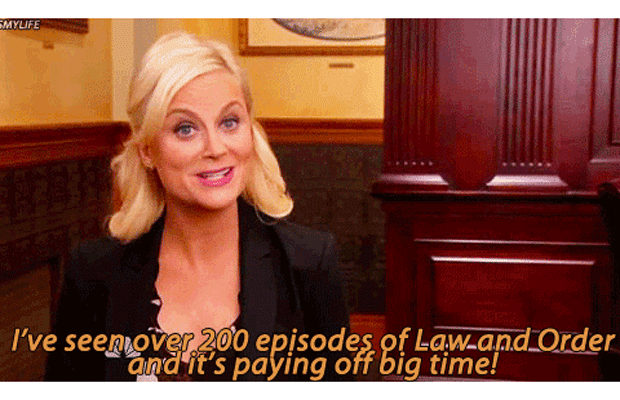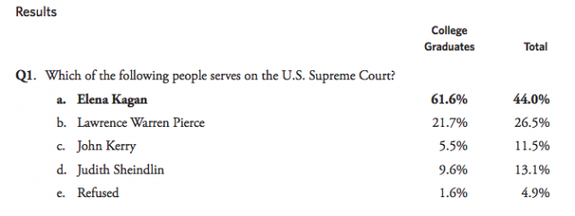
My landlord did “X”, how can I sue them?
I read somewhere that Real Estate is like a continuous episode of Seinfeld, but the joke’s always on you. You are always the George Costanza. George Costanza’s miserable persona isn’t necessarily what’s causing his constant misfortune; said-misfortunes are just a daily acid wash on his soul. I’m sure the day I’m taken away in a straight jacket, I’ll blame that one appointment when it was 95 degrees out and I got stuck in an elevator with a client, her family, the listing broker and a stranger on crutches, prompting the mother, who was claustrophobic, to dissolve into a complete emotional breakdown.
a
This job really forces you to be a chameleon of television personalities; aside from Guy Fieri at breakfast, my favorite reoccurring role is that of Judge Judy. According to a recent study, 10 percent of college graduates – and 13 percent of Americans overall – think that Judge Judy is a Supreme Court Justice:

Back to the conversation: since elements of law are woven into almost every piece of real estate, I’ve been able to mimic the bravado from a family made up entirely of lawyers. While some legal questions are best handled by professionals, a fair amount are solved by basic common sense or google. My favorite question I’m GLAD people ask before pulling an Elle Woods at the Housing Court is, “My landlord did (1 of 10,000 terrible things); how can I sue them?”

^Please pull the reins.
a
So most people have a shaky knowledge of the actual law, considering the default reaction to situations is usually, “how did they cover this is in Law & Order…” If you have to refer to Law & Order: SVU, I think you may be in the wrong place for advice. Aside from the common understanding that your child will become a self-entitled sociopath if you enroll them in private school, let’s discuss the unfortunate repercussions of suing a landlord because you won’t see Ice-T breaking it down for you in some dark alleyway in Nolita.
a
These are their stories. DUN DUN.
a
While the courts always rule heavily in favor of tenants (hence why leases are slanted towards the landlords), do not take lightly the fact that landlords in New York City have a blacklist and if you sue a landlord, good luck trying to rent an apartment or purchase a Co-op. Seriously. Now this isn’t a Mean Girls Burn Book situation where DeBlasio is going to be the Tina Fey of the situation and tell the Plastics, i.e. shadowy landlords, they have to accept you or he’s going to cancel the Spring Fling. Landlords function by their own jurisdiction and Co-op boards can’t be swayed, even by buttery smooth beats by Drake.
a
What is the tenant blacklist?
a
So getting onto the tenant blacklist really isn’t that difficult. All it takes is simply being named in any one of the hundreds of thousands of cases filed in New York City housing court every year, regardless of the reason or the outcome. Whether or not you have a good relationship with your current landlord doesn’t matter – landlords can’t personally get you added to the list.
a
How it works is that tenant screening bureaus comb public court computers for cases and match them to the names and addresses of tenants. They then sell the data along with credit reports to landlords vetting prospective tenants during the rental application process.
a
During the vetting process, landlords rely on this information as they don’t want a renter who’s been sued for not paying the rent, repeatedly paying it late, or will cause any nuisance. For landlords, getting the wrong tenant in the building is impossible to remedy without a lot of time and heavy expenses. That being said, owners want to get it right the first time. The eviction process is very costly and takes at minimum 6 months so the tenant application process is taken quite seriously.
But for tenants, the major issue is that the information is often incomplete. The “blacklist” doesn’t provide any context for what the details of the case were, such as who sued whom, the winning party, the details of the grievance, and whether or not there was a settlement.
a
For the past three years, City Council has introduced bills to try to make the tenant blacklist a bit more fair. The latest bill introduced would require individuals and companies who put together tenant screening reports be licensed and that their reports contain specific details about the substance of each housing court case that’s included
a
How it all goes down?
a
When a tenant withholds rent, regardless of the reason, a landlord can take them to housing court, which deals with cases involving nonpayment of rent and evictions. Sometimes the landlord wins, and the court orders a tenant to pay back rent or move out. Other times the tenant wins, and is allowed to stay or gets a rent abatement. Most of the time, though, the case is settled out of court or dropped. Regardless of the outcome, your name can wind up on a list.
a
Even when a tenant stops paying rent for legitimate reasons – they lack essential services or suffer from mold or vermin – if he winds up in court, he’ll end up on the list. In fact, even in cases that don’t involve money changing hands – like when you’re involved in a so-called possessory judgment, which allows a landlord to take an apartment back – you can still end up on the blacklist.
a
Because tenants are not informed that their names are in the databases, it’s difficult for them to protect themselves. But perhaps the most troublesome part of this all is how the threat of ending up on the list has impacted how tenants react when something goes wrong with their apartment.
a
What do you do if you are on the blacklist?
a
So being on the blacklist doesn’t necessarily make it impossible for you to find an apartment; it simply narrows the options you have at your fingertips. Options to lessen the impact:
a
1. Disclose the issue upfront – most landlords are willing to give a would-be tenant a chance to explain himself, especially if there is only one mark on his or her record
a
2. Skip big time landlords – smaller landlords may be the way to go if you’re on the list, as even if they do use the reports, they may be more willing to understand the specifics of your situation
a
3. Get your landlord’s lawyer involved – if the relationship between the former landlord and tenant is cordial, the tenant can ask the landlord’s lawyer to send a letter stating that he or she was a good tenant
a
4. See if the information was right to start with – To see how your name appears in a database, you can request a report from a company that provides tenant-screening data, such as CoreLogic or On-Site. If there’s anything in the report about a housing court case, you should verify that the information is accurate, and if it’s not, ask the screening bureaus to remove it. Any case older than seven years (a time limit set by the Fair Credit Reporting Act) should be deleted from the report by the agency.
a
5. Get writing of the outcome for your records – Even though a future landlord may not want someone who’s been involved in a case no matter what the situation, you can also request that the screening bureaus report the outcome of a case if you were sued in error.
a
How can you bypass the blacklist in the first place?
a
If you’re in a inhospitable situation with your apartment but worry about winding up with a red flag on your record, there are other ways to get relief that are less likely to land you on the list.
a
1. File a “housing part” action – one of the major types of housing court litigation involves the tenant suing the landlord for failing to comply with the law, particularly when it comes to building repairs, as well as the city for failing to enforce the law. It’s less likely you’ll get blacklisted for this route of attack. Basically the city will send out an inspector and, if there are violations, a landlord can face steep fines. Sans lawyer involved.
a
2. Sue in small claims court or Supreme Court – A tenant can also sue their landlord in small claims, which is separate from the housing court if the case is not initiated by the landlord, and it will not land a tenant on the blacklist.
a
3. Ask to remain anonymous – you can always reach out to the landlord’s attorney before the landlord files a case requesting that they name the tenant only as John or Jane Doe instead of your true name. This is where you should 100% get an attorney involved.